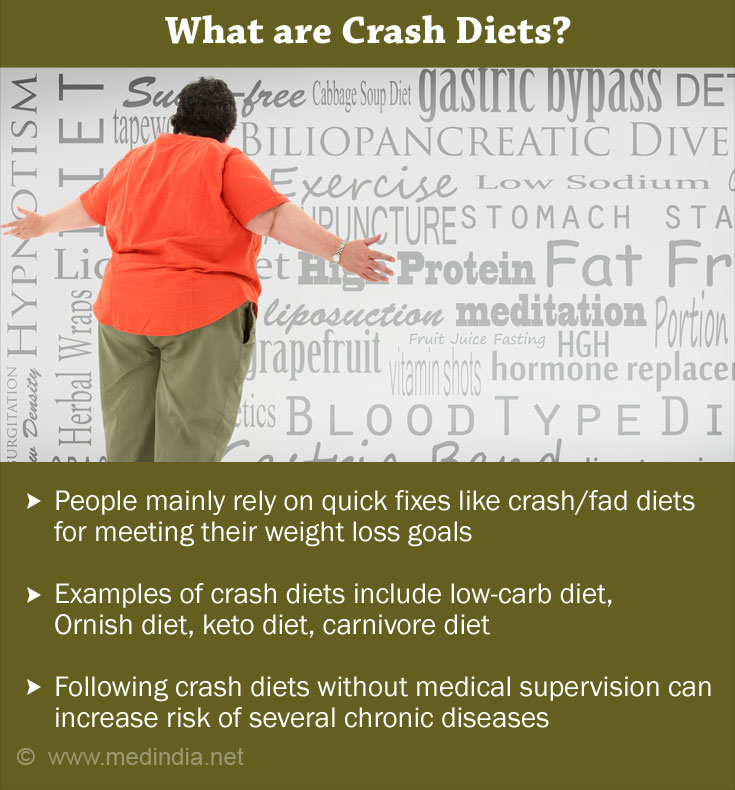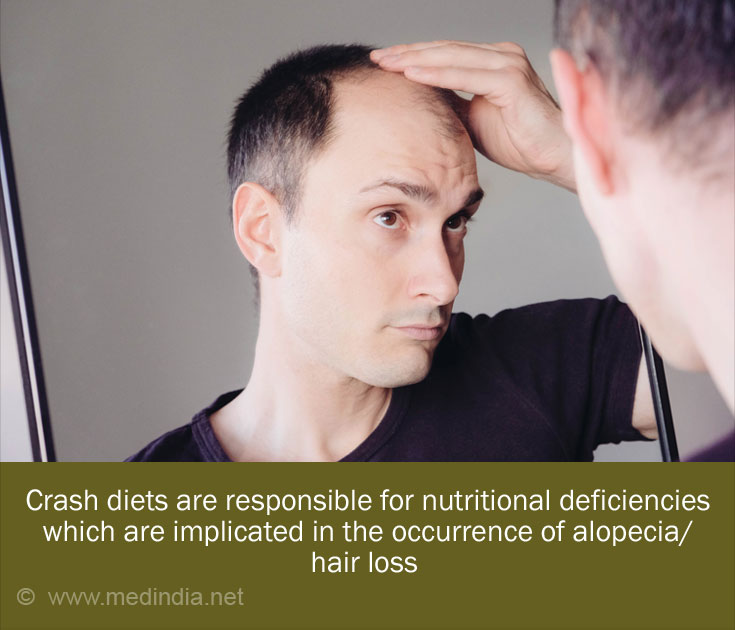- The Role of Vitamins and Minerals in Hair Loss: A Review - (https://www.ncbi.nlm.nih.gov/pmc/articles/PMC6380979/)
- Advantages and Disadvantages of the Ketogenic Diet: A Review Article - (https://www.ncbi.nlm.nih.gov/pmc/articles/PMC7480775/pdf/cureus-0012-00000009639.pdf)
- Alopecia in Crash Dieters - (https://jamanetwork.com/journals/jama/article-abstract/346207)
- Telogen Effluvium Secondary to Starvation Diet - (https://jamanetwork.com/journals/jamadermatology/article-abstract/535900)
Introduction
Following crash diets has been the 'in' thing among the urban population as obesity is becoming an ever expanding pandemic. Hectic work patterns, sedentary lifestyles, poor diet habits are making people choose drastic fad diets for providing a 'quick fix' solution for their health issues. Following these kinds of crash diets without medical supervision can increase risk of several chronic diseases in the long run, while providing quick results for losing weight.
What are Crash or Fad Diets?
Crash or fad diets are restrictive diet plans which provide quick weight loss results but don't have any scientific backing to support their claims. Many crash or fad diets have been developed in the West and have gained popularity due to huge celebrity support. There are several types of crash diets prevalent nowadays and in trend among fitness enthusiasts. Crash diets such as low-carb diet, Ornish diet, keto diet, carnivore diet have been very popular in solely achieving good amount of weight loss.

Trending Fad Diets Gaining Popularity
Ornish Diet
This diet was originally formulated by Dr. Dean Ornish, an American physician, for improving heart health. This diet is also called the low fat diet. This diet excludes intake of meat and meat products and whole fat containing milk and milk products, trans fats and oils and oil containing products. It requires to include more wholesome, natural foods such as beans and legumes, whole fruits, vegetables, whole grains and nonfat milk products.
This diet is useful for losing weight without counting calories and studies have shown the reversal of coronary blockages and reduction in rates of cancer while following this diet.
Keto Diet
This diet emphasizes making the body go through ketosis (increased production of ketones in the body) for using ketones as an energy substrate instead of glucose. It involves considerably reducing the intake of carbohydrates in the body and increasing intake of fats, which shall be then utilized for providing energy to all parts of the body, since fats shall be used as a fuel. This diet provides drastic weight reduction since most fat stores in the body are burned for energy production and carbohydrate content is inadequate.
This diet provides unsustainable weight loss and is quite expensive to follow for a long period of time. It can also lead to constipation, damage bone health, lead to nutrient deficiencies and irregular menstrual cycles(1✔ ✔Trusted Source
Advantages and Disadvantages of the Ketogenic Diet: A Review Article
Go to source).
Carnivores Diet
It excludes all the foods except meat and meat products. Following this diet involves intake of only animal foods which are low in carbohydrates, high in proteins and variable in fat content. Drastic weight loss can be observed due to the caloric deficit it provides and on the downside, it can increase risk of cardiovascular diseases.
The Downside of Following Crash Diets
Crash diets are often restrictive in composition since they often eliminate intake of entire vital food groups which comprise a crucial part of a complete balanced diet. These food groups are rich sources of essential nutrients whose daily intake are met through the daily consumption of these various foods groups. For example, vegetable oils and nuts, seeds contain several essential fatty acids and vitamins such as A and E which may be completely avoided in a low fat diet. Poor fat intake can give poor texture and dry, brittle appearance to the hair strands. A study showed that subjects having androgenic alopecia had low serum levels of Vitamin E(2✔ ✔Trusted Source
The Role of Vitamins and Minerals in Hair Loss: A Review
Go to source).
Low protein content in several of such diet which focus mainly on intake of high fibre foods such as vegetables can give rise to several micronutrient deficiencies such as those of zinc, iron, selenium and B-complex vitamins. Low protein content shall also make hair strands weak and fragile without adequate keratin and collagen content.
How are Crash Diets Implicated in Alopecia or Hair loss?
Crash diets don't take the micronutrient content into consideration which plays a major spoilsport. The nutrients required for improving hair growth and hair health may not be completely taken into consideration while keeping weight loss as main area of priority. While planning a weight loss regime, certain nutrients need to kept into mind to be provided in optimum amounts either through foods or supplementation to prevent alopecia arising due to crash diets. A study found that severe caloric restriction resulted in profuse hair shedding among majority of the study subjects(3✔ ✔Trusted Source
Alopecia in Crash Dieters
Go to source).

Many micronutrients are implicated in the hair growth cycle and the health of the hair follicles. When any of these nutrients fall in the deficiency range, it can hamper the smooth functioning of the hair cycles or damage the structure of hair follicles. This can affect the overall health of the hair follicles causing hair thinning and reduction in hair density. Poor growth of hair strands occurs where many of the hair follicles are pushed into the resting /shedding phase from growth phase. This condition is called telogen effluvium, which is characterised by profuse hair shedding for short period till the diet is provided with optimum supplementation of essential nutrients(4✔ ✔Trusted Source
Telogen Effluvium Secondary to Starvation Diet
Go to source).
The Takeaway for Crash Diets
Crash diets aren't to be followed without due medical supervision. A qualified diet professional or dietitian shall help in providing proper customizing of the diet keeping several factors in mind, preventing nutrient deficiencies at the same time achieving healthy and sustainable weight loss.








